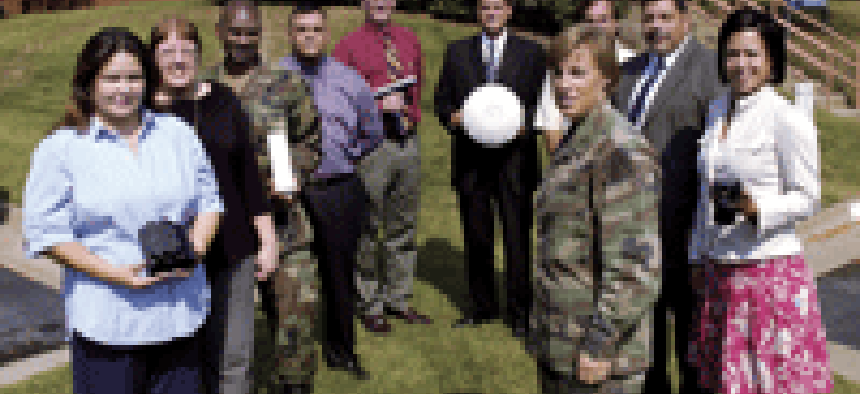If an army travels on its stomach, to paraphrase Napoleon, everything else travels in boxes and shipping containers, on planes, trains and trucks, and, perhaps most importantly, on records of what is sent where, and when.Keeping track of it all is an enormous job, but it's one that has been made easier by the Joint-Automatic Identification Technology project.Run by the Office of the Product Manager, Joint-Automatic Identification Technology (PM J-AIT), the project started out as two separate initiatives, Logistics Applications in Marking and Reading Symbols (LOGMARS) and Microcircuit Technology in Logistics Applications (MITLA).The Army merged the projects to handle contracts for equipment for automatic identification technology, such as bar coding, smart cards, memory buttons, magnetic stripes and optical memory cards.'We still continue to handle all that,' said Lt. Cmdr. Beth C. Rowley, program manager. 'But RFID is the hot technology right now.'Radio frequency identification consists of a special tag attached to a piece of equipment, and fixed or handheld electronic readers'called interrogators'that contact the tags and reads their radio transmissions.The Army's work with RFID goes back to the early 1990s, having grown out of the logistics lessons of the first Gulf War. By 2001, for example, about 85 percent of the equipment and supplies sent by the Defense Logistics Agency to Afghanistan had RFID tags.The next year, the Central Command called for 100 percent RFID tagging. In 2003, the Radio Frequency In-Transit Visibility (RF-ITV) program was transferred to PM J-AIT.With RF-ITV, each shipping container bears a tag'currently about the size of a brick, but being replaced with smaller versions'that includes a battery, antenna, radio transmitter and encoded information about the contents of the container.Interrogators located near gates, railheads and cargo-handling areas automatically query tags within about 300 feet and capture the tag information. That information includes origin, destination and contents.Combined with the current location of the container, it provides a useful means of tracking all military supplies in transit.'Today we track the arrival of an M-1 Abrams tank into the theater, but that fact itself is irrelevant if the tank's basic load or other critical system components can't be located,' said Army Brig. Gen. Charles Fletcher, commander of the Military Surface Deployment and Distribution Command. 'We need to measure success in terms of it getting where it is needed, when it is needed, and ready to fight.'The information, available via the Internet, reports where a container is and what it's holding. Supply managers can then see where expected supplies are, and check in newly arrived supplies rapidly and accurately.'This helps in planning field operations, as well as [with] future procurement requests,' Rowley said. The same information also can identify choke points: places where shipments sit for too long, and where the flow of supplies slows down.The amount of material to track is immense. Rowley said more than a million tags have been sold already. About 15,000 tags are written per week, and more than 100,000 are read each week.The system handles about 100,000 queries per month. Four regional servers'in the United States, Germany, South Korea and Kuwait'handle the data load. Users can display locations in tables, or graphically on computer-generated maps. Because users can access information through the Internet, security is a prime concern.'PM J-AIT is a joint program, and all the services employ RF-ITV to different extents,' Rowley said. The program has supported a number of missions, including the peacekeeping force in Kosovo, Hurricane Mitch relief, Operation Iraqi Freedom and Operation Enduring Freedom.Program officials work closely with NATO and coalition forces to coordinate efforts. British and Australian forces use tags, and PM J-AIT shares tracking information with coalition partners. In addition, PM J-AIT is engaged in working out protocols and security for more international deployment of the technology.PM J-AIT also is advancing RF-ITV in several directions. More interrogators are being placed in new locations, supplementing the 1,600 interrogators already located in 30 countries. This allows the program to both capture information from new places that were previously incommunicado, and to give more granular information about shipment whereabouts.'Mobile and portable interrogators are also available for use on a temporary or ad hoc basis,' Rowley said. For example, relief efforts after Hurricane Katrina are using RF-ITV to track supplies in Alabama, Louisiana and Mississippi.The RF-ITV program is growing'it's already larger than the similar commercial efforts of Wal-Mart and Target combined'and provides technology and consultation to all branches of the military, and to other government agencies as well.The program has saved money, since duplicate orders for missing supplies are unnecessary, officials said. And by eliminating guesswork in the complex chain of supply, the program has improved the delivery of information and supplies to warfighters.'We can use RFID technology to enrich this end-to-end systems view,' Fletcher said, 'allowing us to take the appropriate action at any point in the supply chain to produce the desired result to our customer, whether a soldier in combat or a Gulf Coast family in distress.'
LTOR: left to right: Sandra Alvarez, Danette Bishop, Maj. Jeff Etienne, Ken Higareda, Ted Jockenhoefer, Jim Alexander, LTC Beth Rowley, Bill Philyaw, Lee Weaver, Denisesha Moore
Zaid Hamid




